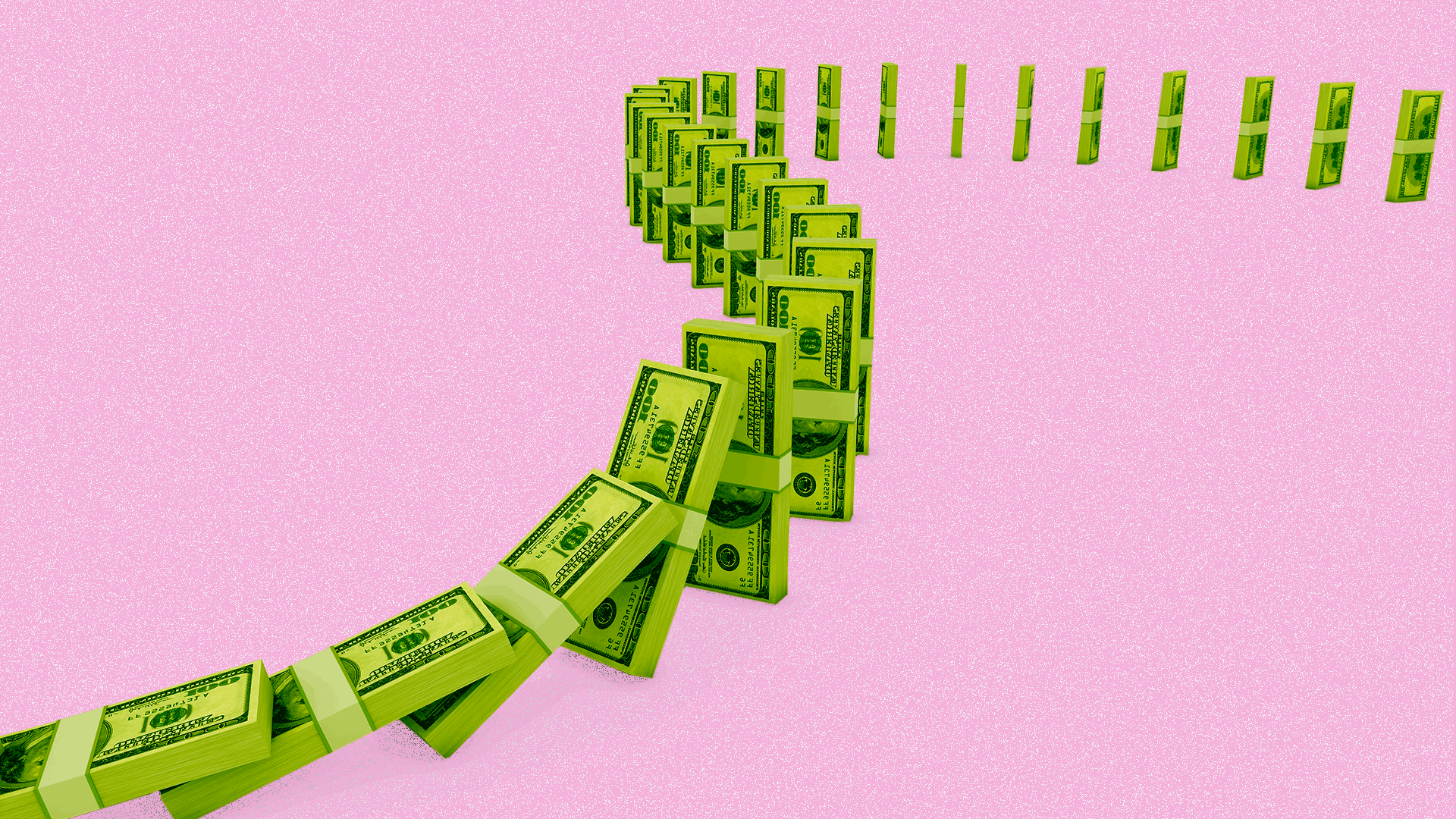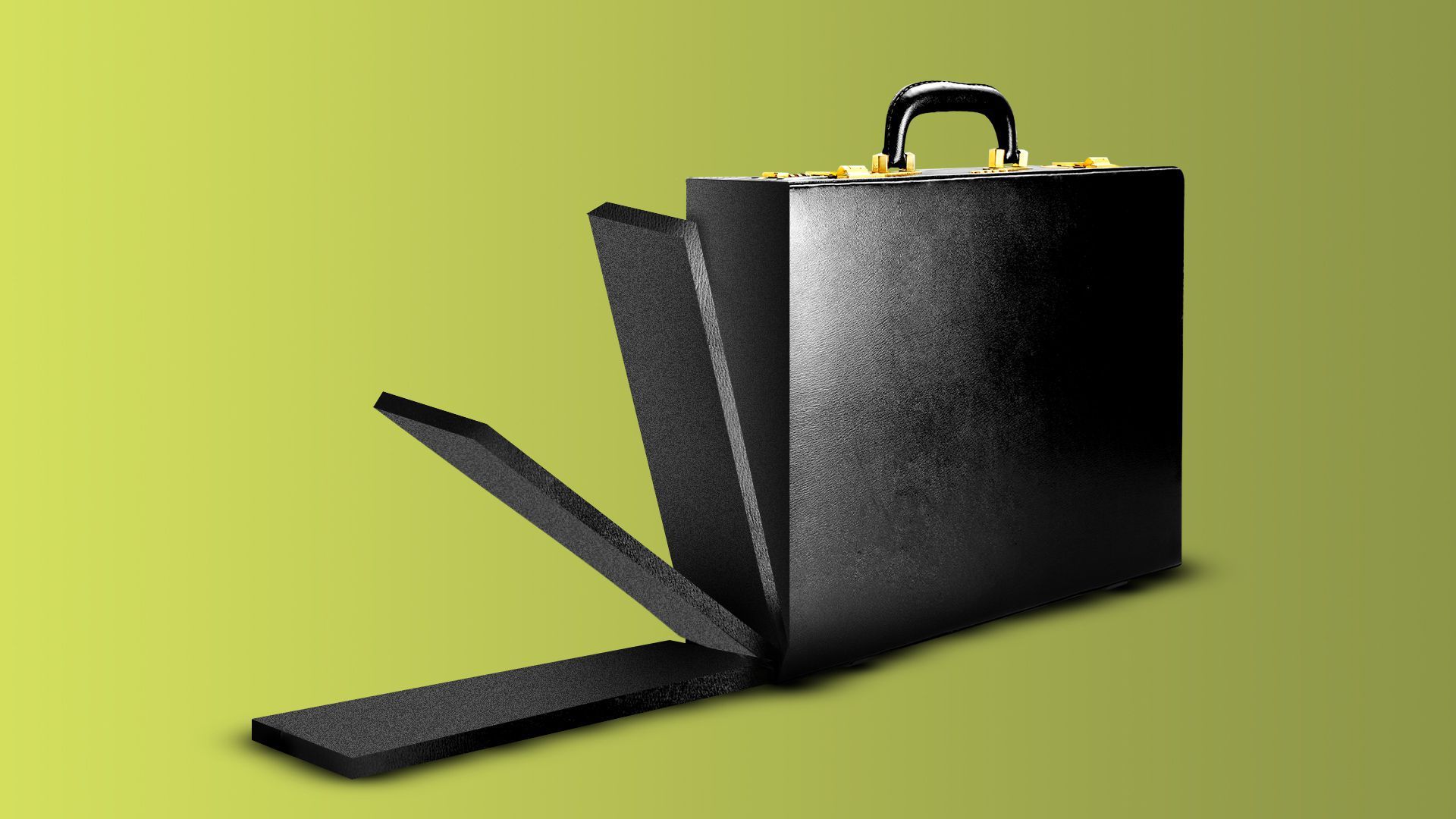| | | | | | | Presented By Aon | | | | Axios Markets | | By Kate Marino ·Oct 12, 2021 | | 😎 Good morning! Thanks for spending another one with Team Markets. Let's dive right in. Today's newsletter is 1,253 words, 5 minutes. | | | | | | 1 big thing: Another fine mess for the IMF |  | | | Illustration: Aïda Amer/Axios | | | | The messiness of international politics is on full display this week in Washington, D.C., at the spring meetings of the International Monetary Fund and the World Bank. That's inevitably going to make it harder for the storied institutions to help the world's poorest countries recover from the pandemic, Axios' chief financial correspondent Felix Salmon writes. Why it matters: The IMF's leadership has never been weaker — managing director Kristalina Georgieva is weakened by scandal, while her #2, Trump nominee Geoffrey Okamoto, is generally regarded as inexperienced and otiose. Driving the news: The IMF said late Monday that Georgieva will keep her job after she was caught up in a scandal surrounding a World Bank survey on the ease of doing business in countries around the world. - The fight, which involved Georgieva personally hiring her own crisis PR firm, pitted the U.S. and Japan, who wanted her fired, against the EU, UK, Russia, and China, who wanted her to remain.
- It took eight separate board meetings before an agreement was finally reached that Georgieva should be allowed to keep her job.
The big picture: The managing directorship of the IMF is the most political job in international finance. To be successful, the IMF chief needs to corral the support of all the world's major economies, including the U.S. — support that Georgieva seems to lack. - Between the lines: The shareholders of the IMF are also the shareholders of the World Bank. Now that Georgieva is safe, it is certain that the bank's president, David Malpass, will also remain in his job.
- While Malpass was also tarnished as the scandal spread, the evidence against him was never as strong as the evidence against Georgieva.
Flashback: For all its geopolitical importance, the job of IMF managing director has attracted its fair share of controversy and scandal. - Previous occupants this century include Horst Köhler, who resigned under pressure as president of Germany; Rodrigo Rato, who was sentenced to 4.5 years in prison for embezzlement in his native Spain; and Dominique Strauss-Kahn, who was charged with sexual assault in New York and "aggravated pimping" in France, although he was acquitted of both charges.
Our thought bubble: There are few winners this week. But one institution has emerged even more solidified and entrenched — the anachronistic and colonialist convention that the IMF should always be led by a European and the World Bank by an American. - If and when Georgieva is eventually replaced, you can be as sure as ever that her replacement will come from Europe, rather than from the countries in the Global South whom the Fund ostensibly serves.
|     | | | | | | 2. Catch up quick | | Southwest Airlines canceled another 360 flights on Monday, following about 1900 cancellations over the weekend, as the carrier struggles with worker shortfalls and a return of travel demand. (WSJ) China Evergrande on Tuesday failed to make interest payments due on its bonds, marking the third round of bond payments it's missed in three weeks. (Reuters) Black business owners were more likely to get Paycheck Protection Program loans from fintechs and large banks that use automated systems than from smaller banks, and human bias appears to be the main reason. (NYT) |     | | | | | | 3. Evergrande isn't alone |  | | | Illustration: Aïda Amer/Axios | | | | China Evergrande's debt problems aren't an anomaly. Signs of stress are piling up in China's real estate development sector, and more companies are signaling they may not be able to pay back their debt. Driving the news: Fellow builder Modern Land asked its bondholders if it could delay a bond payment by three months, and Sinic said it will likely default next week, Reuters reports. Why it matters: Widespread distress in the Chinese property market could bleed into other areas of its massive economy, as well as negatively impact the global markets for commodities and raw materials. - Watch for a domino effect among the builders.
- Each company that acknowledges it can't make debt payments makes it a little more palatable for others to join their ranks, Aayush Sonthalia, portfolio manager for emerging markets debt at PGIM Fixed Income, tells Axios.
State of play: Repayment is in doubt for any bonds issued by Chinese property developers that have lower credit ratings and an upcoming maturity, Sonthalia adds. - One reason: Chinese banks have tightened their lending standards. If a company doesn't pass the "three red lines" test, it may not be able to get money to refinance.
- On top of that, weak property sales data was just released. That's not a good sign for the developers' ability to shore up their balance sheets.
The impact: The sell-off across the bond market has been broad. Even higher-quality investment-grade bonds backing Chinese developers are now trading in the 80 cents on the dollar area, Santhalia says. What we're watching: The Chinese government's next move. - "Our view is that by the end of this year, we're going to see some further loosening of monetary conditions and possibly some fiscal support as well. The economy is so dependent on the sector ... they don't want a complete collapse," Santhalia adds.
|     | | | | | | A message from Aon | | New risks require better decisions | | |  | | | | In the wake of COVID-19, Aon surveyed 800 leaders across the U.S., the EU, the United Kingdom and Canada to learn how the experience has changed how companies integrate risk assessment, data and expertise to mitigate volatility. Here's what they said. | | | | | | 4. Oil price milestone |  Data: FactSet; Chart: Axios Visuals U.S. crude oil just closed above $80 per barrel for the first time since 2014. Why it matters: The meteoric rise of oil, natural gas and coal has sent energy costs up around the world. State of play: In a bid to keep prices down, U.S. Energy Secretary Jennifer Granholm has considered releasing more oil from the country's strategic petroleum reserve, Reuters reported. - The Biden administration also in August called for OPEC to increase production.
What we're watching: Whether U.S. shale producers start upping their output faster. - So far, the number of active oil and natural gas rigs in the U.S. is nowhere near pre-pandemic levels, as we wrote about Monday.
|     | | |  | | | | If you like this newsletter, your friends may, too! Refer your friends and get free Axios swag when they sign up. | | | | | | | | 5. Tech embraces global minimum tax |  | | | Illustration: Aïda Amer/Axios | | | | A new global agreement to levy a near-universal 15% minimum tax on large corporations' profits could cost tech giants billions each year. Yet lobbies representing the companies have rallied behind the plan, largely because it phases out a different kind of tax that tech dislikes, even more, Axios' Scott Rosenberg writes. The big picture: The minimum tax passed a crucial hurdle last week when more than 130 nations reached an agreement at an Organization for Economic Cooperation and Development (OECD) meeting. It still awaits final approval from many stakeholders, including the U.S. Congress. Driving the news: Both the Internet Association and the Computer & Communications Industry Association (CCIA) signaled tentative support for the global tax after the agreement. "This is an important step towards more fairness and certainty in the global tax system," CCIA vice president Christian Borggreen said in a statement. Tech's biggest reason to be enthusiastic about this tax: Countries that sign on to the scheme will also be required to back away from existing or planned "digital services" taxes that take specific aim at tech revenue. - Dozens of countries around the world already have such taxes in place or are in process of implementing them, including France, the U.K., Italy and Canada.
- Companies that are unhappy at the prospect of a broad and varying digital services tax regime view the minimum tax approach as a lesser evil.
Between the lines: Tech companies, like other corporations operating globally, often move assets from nation to nation to minimize their tax liabilities. The intrigue: The OECD vote looks like a tentative win for the Biden administration's multilateral approach to resolving the tax issue, in contrast to the Trump administration's disdain for that kind of diplomacy. Keep reading. |     | | | | | | A message from Aon | | A growing appetite for risk in a more volatile world | | |  | | | | 80% of business leaders surveyed in new research from Aon say that the COVID-19 pandemic has increased their companies' appetite to take on risk and make investments to build resiliency for the future. Explore additional insights in our report. | | |  | | It'll help you deliver employee communications more effectively. | | | | | | Axios thanks our partners for supporting our newsletters. If you're interested in advertising, learn more here.
Sponsorship has no influence on editorial content. Axios, 3100 Clarendon Blvd, Suite 1300, Arlington VA 22201 | | | You received this email because you signed up for newsletters from Axios.
Change your preferences or unsubscribe here. | | | Was this email forwarded to you?
Sign up now to get Axios in your inbox. | | | | Follow Axios on social media:    | | | | | |












No comments:
Post a Comment